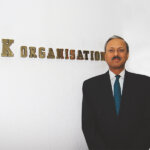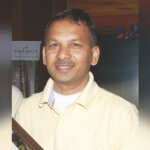
In this edition team Paper Mart decided to do something different which was not done earlier by us. Sitting on the round table everyone was lost in the thought “what different”. Suddenly an idea crossed the mind to showcase the individual who belongs to a different gender but has decided to make her future in this industry. Ms. Niyati Agrawal, Sr. Vice President, Rainbow Papers Ltd has evolved in the industry from the scratch and learned the strategy of business from every level she went through. During the interaction she told us about her evolution process in the industry, challenges, company’s strategy behind expansion etc. Excerpts:
Paper Mart: How you came to the paper industry?
Niyati Agrawal: I did my MBA from NMIMS, Mumbai. I did have offers from other companies at that time to pick up. But, I was keen on joining my family business to add value to what we already had because being educated I wanted to contribute to my business rather than joining elsewhere. Once I joined I realized that the paper industry is so dynamic and it has got a lot of potential which has been unexplored. And now paper is posing interesting career options for lot of youngsters. I joined in about 7 years back when our main challenge was to build our export market and expand our international boundaries. Today, I have my head involved in almost every field whether it is marketing, international business, day to day finance, waste paper procurement etc. Technical is one part where I am not involved.
PM: What do you think the most significant lessons you have learnt about managing and particularly managing the change and adapting in the industry.
NA: One strong lesson that I learnt was during our expansion mode, that planning is very important and you need to plan even the smallest possible detail of the work. As management if we are not planned we cannot direct people and give them confidence to take the crucial decisions.
Just to sight an example of change and adaptability, 2 years back during implementing ERP the work got stuck for 5-6 days and all the work came to a standstill because we were adapting to a system which was new. Now 2 years down the line my people could not think beyond ERP, they cannot think of putting up a system where ERP cannot be used because it is so convenient. So this takes me to the second point that after planning you need to give it required set of guiding principles as well as the required time to adapt.
Change is not subjected to one person in an organization; it is the organization as a whole. It’s people who are eventually going to be the one who will have to adapt to the change and perform accordingly. So the change cannot be done without the consultation of your people. So, once the bold decision was taken that we have to bring the machine, the next thing was to sit with all the partners and tell that boss we have done this. So, now we are going to move ahead and this is where we are going to lead you all. Your goals should be realistic, they should be achievable and they should be measurable.
PM: What are the difficulties you have faced with in the paper industry and how you overcome them?
NA: Waste paper procurement is going to remain an issue because of the multiple use of paper. The next challenge would be availability of skilled manpower apart from the regular changes which are coming within the business environment is something which we are facing.
During the expansion the difficulty that we faced was on technological front. When we took the bold decision of bringing the 2 machines, we had to send our technical people abroad to learn how to run the machines. Since technology there was far better and far more advanced as compared to the Indian technology it took time to adapt to that technology which was sorted out with course of time. The entire process of bringing machines here was not as easy as it was expected. We need to comply with various environmental norms in Germany, there were norms which related to timing, skills and all of them had to be tackled at one point of time.
PM: Now, apart from that being a feminine gender did you see any difficulty in context of working within the industry?
NA: Initially it was little hard because people under you are far senior. I started at very low level as a documentation executive and then slowly transition happened and I moved into the marketing, projects & exports etc. It is important also because to understand the business you need to really start from the ground level and then slowly move up when you are sensitized to every possible level in the organization. Initially people would not really take you too seriously and treat you just as the boss’s daughter. But today there are people who are working under me or with me, I am aware of the exact problems they might be facing and it makes easier for me to sort out that problem. So initially there might be a sentiment that she is the boss’s daughter only but slowly and gradually I think as you move up and take up your responsibilities you start gaining the respect.
PM: Dearth of manpower in the industry and how we can tackle it?
NA: There is a major lacking of manpower at the operational and supervisory level. As far as marketing, finance and human resources are concerned I don’t see it much of an issue these are the departments wherein you will still find good educated people who can run the department. To run a paper industry you need skilled manpower which is not available. This issue can be tackled by running the vocational training or on the job training. Vocational training and on the job training are two separate concepts, on the job training is that you hire a person fairly skilled or semi skilled and put him on the job under a skilled worker and slowly and gradually he learns the process, this is one. Secondly you can run vocational courses for couple of months giving an overview about the industry, technology, operations etc.
PM: About the expansion which Rainbow has initiated can you give a quick outline about it and the strategy behind it?
NA: We have picked up two paper machines from Germany; they were dismantled and brought to India, after which PM7 was commissioned in the year 2009. It is running to its full capacity. Now PM8 is under installation and start up is scheduled in 3-4 months time. We are also installing power plant
of 20 mw which is also under the process.
The strategy behind this expansion was, earlier we were only into the board segment and thus in order to widen our product portfolio and also seeing the solid demand in newsprint and writing & printing paper we thought of bringing these 2 machines. Besides, paper industry is a volume centric industry so if we have better volumes than we have better economies of scale and one cannot survive being a small size mill.
Even when these two machines were picked up the next strategic decision was whether to install them together or to prepare one at a time. The decision was to go for one at a time because the combined capacity of these two machines was around 500-550 TPD and we were talking about a jump from 300 to 900 TPD at one go which was essentially tripling the size. It sounds really good but on the practical side there are challenges in terms of capital, adaptability by people to handle 900 TPD from 300 TPD. Also newsprint and writing & printing was a new segment for us thus we decided to do stage wise implementation wherein install first machine, introduce the product in the market, create an image for Rainbow and then put in the next machine.
Now we are targeting to create a brand Rainbow for which we are planning to move into the value added products like stationary, copier papers, notebooks etc. We are going to start on the branding activity in the mid of 2012.
We have set the target to become a thousand crore turnover company by 2013-14.



